An Overview of Strategy Meetings
This is one of the questions that we get asked the most frequently when we're helping clients integrate strategy with their business as usual. The answer is going to be a little different depending on what type of organization you are and what type of strategy you're implementing.
But either way, we're going to use this post to give you as concrete an answer as we can muster!
The best strategy meeting frequency is the one that you actually stick to.
OK, so maybe that's a bit of a cop-out - but the truth is that the biggest problem with most strategy meetings is that either:
a) They don't happen, or
b) They happen, but no-one actually talks about strategy
So whilst this post is a great starting point for figuring out the frequency of your strategy meetings, you need to constantly review whether you're starting to fall into one of the traps above, and adjust things accordingly.
We've already written about what a good strategy meeting should cover in terms of content and how to facilitate a successful strategy meeting, so if you're finding strategy meetings in your organization aren't actually covering the progress of your strategy, view this article.
Check out this infographic that gives a quick summary of how to go about planning out the frequency of your strategy meetings:

As you can see, the two biggest factors that influence this decision are:
(a) How strategically mature is your organization, and
(b) How long is your current strategy?
Strategic Maturity / Strategy Meeting Frequency
Let's start by looking at the more complex aspect of the equation - strategic maturity.
This can of course mean lots of different things, but the important thing is to make an honest assessment of your current level of strategic maturity.
By that, we mean that you need to assess how effective your current leadership team are going to be at operating strategically.
You'll need to consider factors such as their:
Overall buy-in to the strategy
Are you generally satisfied that your team believe in the strategy and are ready and willing to give it their all?
Capacity to take on additional work
Are your team already buried in what they consider 'business as usual'? If so, then it's going to be extra hard for them to 'make time' for the new strategy.
I'm using 'quotation marks' here because if you find this to be true for your team, it's likely that you have a bigger issue around prioritization and the broader integration of BAU activities into your strategy.
Team-member quality
Remember that whilst it might be your leadership team who are attending the strategy meetings, it's their own teams who will likely be executing many of the Projects within the strategy.
Therefore teams with strong players will tend to adapt more quickly to operating strategically than those with deeper personnel issues.
Ability to focus and ruthlessly prioritized
One of the hardest things that organizations struggle with when it comes to strategy execution is what not to do.
To be strategically mature, your team needs to have the confidence to drop things they're doing or push back on strategies that aren't working.
Proven success with strategy execution
The simple truth is that people who haven't got a track record of successfully implementing strategy in a team environment will likely struggle the first few times that they try to change their behaviors.
Have your team done this kind of thing before or are they essentially strategy newbies?
Now that you have an idea of the types of things you need to consider regarding the strategic maturity of your team, where do they fall on the matrix above?
Length of Strategy / Strategy Meeting Frequency
The second key aspect that you need to consider when thinking about the frequency of your strategy meetings, is the length of your strategy.
Most strategies tend to be around 1 year long (at the short end) through to 5 years long (at the long end). That's because it's often hard to make truly impactful changes in less than a year.
And any strategy over 5 years is likely to suffer so much from a changing environment that it's realistically very hard to maintain an effective strategy for that period of time.
It's perfectly fine to take a 5 year strategy and break it up into shorter 'focus periods' so it may be that you have a 5 year strategy, but you run it as a series of shorter 'phases'.
Another way of looking at this question is how intensely do you want to focus on strategy as an organization?
Are you looking to drive through major strategic change where the majority of people's time is spent on strategic initiatives? If so, you should consider that a 'shorter' strategy for the purposes of the matrix.
On the other hand, maybe your strategy is more like 'turning around a cargo ship' and needs to be implemented slowly without disrupting your current business too much.
In that case, you can probably afford to treat this as a 'longer' strategy and have strategy meetings less frequently.
Use the Matrix as a Starting Point
The matrix that we've created for strategy meeting frequency is a great place to start.
It will force you to ask hard questions about the nature of your strategy and the capability of your team. But after every single strategy meeting, you need to be asking yourself questions like:
- Did that feel like a meeting for the sake of a meeting?
- Did it feel like overkill in terms of detail?
- Did people start to disengage and lose interest in the parts of the meeting where they weren't talking?
If the answer to any of the above is yes then it's possible that your strategy meetings are too frequent.
Conversely, you also need to ask questions like:
- Did that feel like a very high-level meeting where we talked about concepts more than specifics?
- Are we losing track of why we're doing the things we're doing?
- Did it feel like we didn't make much progress on things vs the previous meeting?
If the answer is yes to any of the above, then it's likely that your strategy meetings are not frequent enough.
Keep questioning the effectiveness of your strategy meetings and tweak their content to ensure that you feel good about each and every one that you run!



.avif)

.png)
.jpg)
.jpg)
%20(1)%20(1)%20(1)%20(1)%20(1).png)



